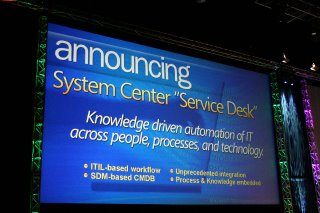 This past week has been incredibly huge for my team at Microsoft.
This past week has been incredibly huge for my team at Microsoft.After much time spent researching, planning, designing, and beginning to build our new product, we finally announced its existence to analysts, partners, and most importantly to many of our greatest customers at the 2006 Microsoft Management Summit in San Diego.
I won't talk too much about it here in the future. I've actually started a Service Desk blog with my team at work where we plan to announce and discuss information as it becomes available.
That said, I figure now's a good time to share some information about what I've been spending most of the past year of my life working on.
Organizationally, I'm a part of the System Center suite of products, which is a part of the larger Windows Server System. System Center is all about empowering IT Pros with the best software available to manage their IT environments. Before coming to Microsoft, I worked a hodgepodge of IT-related jobs for about 10 years (yep - starting at about age 13). I've had the opportunity to do everything ranging from IT office support to helpdesk support to systems administration to network engineering to IT tool development to IT professional services consulting - in environments ranging from small-medium sized businesses to Fortune 500 companies to educational instutions (1000 person high schools to 40,000+ person universities). I guess you could say I sort of "grew up" around IT. So landing on the System Center team at Microsoft turned out to be a pretty good fit.
The way I explain what I do to my Mom goes something like this...
Let's say you buy a desktop computer from Dell. On average, let's say *something* will go wrong with that new computer every few months (if you're lucky?). Hardware will fail, it will get a virus, its connection to the Internet will go down, it will need software updates, you'll forget your password(s), and so on and so forth.
Now, imagine you're a business with 340,000 desktop computers (that's about how many Microsoft has - not including any internal or external facing servers). Things are going wrong all day every day. Even when things aren't going "wrong", things need attention - users need new versions of software, new access to various systems, etc. How do you manage such an environment? How do you install a new operating system on over 300,000 computers? How do you find out when the security of systems are compromised and disable their physical network port (or can a system do this for you without you ever even finding out)? How do you measure not only whether or not your email servers are up, but how many of your 300,000 computers can actually send/receive email through them? How do you know which services and users could be affected by a change you're about to make to a network device, and when problems do occur, how do you know if they were caused by such a change?
These are the kinds of IT challenges that every organization faces on some level. Many orgs use a hodgepodge of random tools that don't work too well together. Others spend their time and money hacking together their own custom tools. You might've seen/heard some mumbojumbo about "are your people ready?", "your potential, our passion", and "helping people/businesses realize their full potentials". Building the best software so that our customers don't have to waste time/resources building it themselves, don't have to waste time/resources getting software pieces to work well together, and don't have to waste time/resources doing the same routine tasks day in and day out.. is what it's all about.
As for my individual role.. I've talked about and linked to quite a bit of information about what it's like to be a Program Manager. The coolest thing about being a Program Manager on this team is the scope I've been able to take on and the impact I've been able to have. Probably shouldn't talk about individual features yet, but being able to own and drive 4 feature areas across the product on a relatively small team has been an amazing experience so far. We sometimes joke about college new-hires in big groups like Windows or Office owning features like "the recycling bin icon" or "the tools->options menu". Totally hasn't been the case here. So far, nothing beats working on a brand new product in "startup mode" with no old code, no old bugs, no old poor design decisions. Perhaps the most difficult part of my job has been having to bite my tongue every time over the past year when a customer has emailed us and asked why we aren't building and selling them this product. And that's a problem any team in any company would love to have.
Anyhow, it's a beautiful sunny day in Los Angeles, and I'd better get out and enjoy it before heading back up to Seattle later tonight.
I guess the last thing I'll say is that if you're also interested in building software to solve these kinds of challenges, my team is hiring often for lots of different positions. Drop me an email with your resume, and I'd be happy to forward it on.

1 comment:
I am extremely interested to work for your team, hence I have sent you my resume.
Looking forward to your suggestions and reply.
Post a Comment